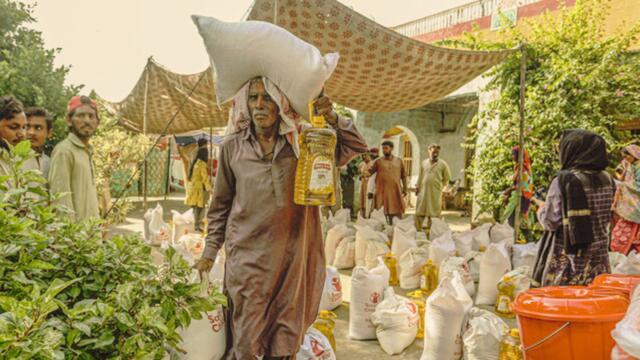- Blogs
- 2025 Floods: A Natural Disaster or Human-Caused Catastrophe?
2025 Floods: A Natural Disaster or Human-Caused Catastrophe?

Fatima Bibi
On 25 August 2025, I was returning to my hometown. While on my way, I saw some agricultural lands near the bank of the River Ravi submerged in water. That day, something scared me, possibly the fear of the floods expanding to the hectares of agricultural land beyond Jassar. Within two days, the people of rural Narowal witnessed the historic floods in their communities. On 28 August, we watched big headlines by mainstream media, liked viral reels on social media, and the development sector reached out to affected communities. Still, after a few days, the situation got back to normal. The government and the other stakeholders abandoned the vulnerable communities because most stakeholders have been unsuccessful in offering long-term solutions to future climate disasters.
Many of us blamed India for the 2025 floods, while many innocent people asked for forgiveness from God for their misdeeds, and some made global carbon emissions responsible for this catastrophe. Through experimentation, it’s proven that fossil fuel companies are the primary agents of global climate change, but the question of mitigation and adaptation remains. Providing flood relief kits to displaced people, giving one semester fee exemptions to first-year students, and loan exemptions to farmers are temporary solutions that do not impact people’s lives. There are clearly loopholes in the governance and policy-making of the Pakistani government, which have caused it to fail to cope with the aftermath of floods, especially in agriculture.
In an updated report by UNICEF, Khyber Pakhtunkhwa (KP) and Punjab are the most affected provinces. Since June 26, 1,006 deaths have occurred, and 3.0 million people have been displaced. According to DAWN news, around 2.5 million agricultural lands have been devastated due to the 2025 floods. The major damaged crops include rice, sugarcane, maize, and cotton. Rice, one of the vital exports, holds a massive share in Gross Domestic Product, contributing to food insecurity and an economic crisis. Additionally, the 2025 floods will affect farmers in every realm as they will not have enough income to buy food, give their children access to education and medical supplies, and capital to invest in restoring the fertility of agricultural lands. Moreover, farmers will have to take loans from middlemen or the government to grow wheat to compensate for the loss they incurred this season due to floods.
The major stakeholder in the agricultural sector that has been ignored is those who take land on lease and grow crops. Dozens of farmers in my locality generally take land on lease for three years. They lost hundreds of acres of rice crop due to severe flooding in the River Ravi. Their economy gets lost within hours, yet no one takes their concerns seriously. The government has no long-term plan to support lessees who address the food shortage in the country. At the same time, in the development centre, almost a negligible number of organisations work for the betterment of farmers.
Additionally, the farmers are the most vulnerable group in the country, as their needs have largely been ignored in decision-making. From low food prices to negligible support for small-scale farmers to a lack of technology and innovation in farming, climate change is just exacerbating the situation. In a nutshell, the 2025 floods are yet another evidence that the government didn’t draw any lessons from the 2022 floods and failed at governance again.
According to my observations in District Narowal, most of the funds and donations couldn’t reach the deserving families as they couldn’t make their way due to the loss of infrastructure in the submerged villages. There is an urgent need for a transparent system that can help track the distribution of funds. Drawing from observations in my local community, there is an immediate need to construct culverts to manage water flow. In conclusion, the provision of climate-resistant seeds, an increase in the water-carrying capacities of rivers and canals, provision of financial or logistical support in re-levelling of lands, and restoration of wetlands are some of the key recommendations, rooted in sustainability and local knowledge, that can help in minimising the damage caused by natural calamities.
Disclaimer: The views expressed in this article are solely those of the author and do not necessarily reflect the official stance of The Himalayan Research Institute Pakistan - (THRIP)
_________________________________
Fatima Bibi is a recent Political Science graduate from Government College University, Lahore, and the founder of Dahqaan Pakistan.
Contact us

Write with Us
The Himalayan Research Institute is proud to introduce "Himalayan," a dynamic and insightful magazin...
- [email protected]
- +923426470466
- website
